
Related
Guests
- Voices From NYC "Stop-and-Frisk" Marchwith the Reverend Al Sharpton, Donna Lieberman of the New York Civil Liberties Union, Benjamin Jealous of the NAACP, and stop-and-frisk victims Jason Morales and Joseph Norris.
Thousands of people held a silent march in New York City on Sunday to protest the New York City Police Department’s controversial “stop-and-frisk” policies. The warrantless search initiative has drawn accusations of being unconstitutional, while mostly targeting people of color, overwhelmingly black and Latino men. We hear from several voices at the march: Reverend Al Sharpton, Donna Lieberman of the New York Civil Liberties Union, Benjamin Jealous of the NAACP, and New York City residents who have endured dozens of stop-and-frisk searches. [includes rush transcript]
Transcript
JUAN GONZÁLEZ: Thousands of people took to the streets Sunday to protest the New York City Police Department’s controversial stop-and-frisk policies. Organized by the NAACP, the protest marked only the second time the organization has held a silent march. The last time was in 1917 to protest lynching. Last year, the New York police officers stopped and interrogated people nearly 700,000 times. Nine out of 10 ultimately were not arrested or ticketed. According to the New York Civil Liberties Union, about 87 percent of those stopped were black or Latino. In all, there were more stops of young African-American men than the total population of that group in the city.
AMY GOODMAN: Yesterday, at this massive march that went from Harlem to outside Mayor Bloomberg’s home, I spoke with a number of people at the march, including Donna Lieberman of the New York Civil Liberties Union, Ben Jealous of the NAACP, but first, Reverend Al Sharpton, who disagreed with Mayor Bloomberg’s assessment the city has been made safer by stop-and-frisk.
REV. AL SHARPTON: The fact is that the mayor has not confiscated many more guns than was confiscated in 2003. The fact is that 88 percent of the people they’ve stopped were not committing a crime, there was nothing on them. So how is it safer? The net result is that you’re having more innocent people harassed, and you’re not collecting more guns. Why have a net negative if you can sit down with the community, sit down with those policymakers, like the New York City Civil Liberties Union, and come with policy that doesn’t say check your civil rights and civil liberties at the door to fight against crime? We want to fight crime. But we don’t want to pay it at the expense.
AMY GOODMAN: What legislation do you want to see passed?
REV. AL SHARPTON: Donna?
AMY GOODMAN: Donna Lieberman of the NYCLU?
DONNA LIEBERMAN: We want the passage by the city council of the Community Justice Act. We want an independent inspector general for the NYPD. Every agency in the city and every other police department in the nation has an independent inspector general except the NYPD. It’s clear what happens when you don’t have accountability. They are out of control at the NYPD, and they have to bring stop-and-frisk in check.
REV. AL SHARPTON: Ben Jealous, please.
AMY GOODMAN: Do think President Obama should issue an executive order? What kind of legislation do you want to see at the national level, Ben Jealous?
BENJAMIN JEALOUS: Well, what we know, as far as ending this program, is that this mayor and—you know, that this mayor can shut it down right now. He has ratcheted it up. We were all out here in 1999, when there were 80,000 stop-and-frisks. This year they’re on pace for 800,000 stop-and-frisks. And so, it will take this mayor, it will take the head of—you know, it will take Kelly, the head of the NYPD—I’m sorry, this is the first press conference with my daughter playing with my hair. You know, and so, you know, what’s real is that this doesn’t take the president. The mayor can do it. The chief of cops can do it. They can shut it right down.
AMY GOODMAN: Reverend Sharpton, how does—
REV. AL SHARPTON: Well, we do intend to go to the Justice Department. There’s already been one meeting. We intend to press this with Eric Holder. Holder was at our National Action Network conference. He’s coming to the NAACP, works for 1199. If we have to go to the federal government, we will. But wouldn’t it be sad that you’d have to take the New York City government to the Justice Department like they used to do in the Deep South? We would hope the mayor wouldn’t force that, but we’re willing to do that.
AMY GOODMAN: How does the police killing of Ramarley Graham fit into this story?
REV. AL SHARPTON: It started as a stop-and-frisk. His parents are with us today. They started as a stop-and-frisk that went bad. And that is what we’re talking about. The dangers, the risks are not worth a program that does not really cut down on violence.
AMY GOODMAN: Tomorrow on Democracy Now!, we’ll bring you the story of Ramarley Graham. We’ll speak with his mother. But at the end of the march, in front of Mayor Bloomberg’s home on the Upper East Side, one of the wealthiest areas of the United States, I spoke with some of the young people on the march. All had been subjected to stop-and-frisk.
JASON MORALES: We’re here from 1199 representing our young workers’ Purple Gold program. And we’re here to—
AMY GOODMAN: What’s your name?
JASON MORALES: Jason Morales, political organizer, 1199.
AMY GOODMAN: Have you ever been stopped?
JASON MORALES: Absolutely, plenty of times.
AMY GOODMAN: What do you mean, plenty of times?
JASON MORALES: It’s been more than 20 times that I’ve been stopped and frisked in my neighborhood in Brooklyn.
AMY GOODMAN: Where?
JASON MORALES: Brooklyn, New York, Bedford-Stuyvesant.
AMY GOODMAN: Were you arrested?
JASON MORALES: I was not, not one time.
AMY GOODMAN: So, why were you stopped?
JASON MORALES: I’m assuming because of the color of my skin. I’m brown, I’m a Latino, and we experience that day in and day out. As a teenager, that’s all I experienced.
AMY GOODMAN: I see a tattoo on your arm that’s a picture of the Statue of Liberty.
JASON MORALES: Oh, that’s right. It’s supposed to represent liberty. But unfortunately, walking down the street, I get stopped, and it makes me question how loyal I am to the NYPD.
AMY GOODMAN: Why do they say they’re stopping you?
JASON MORALES: They got a call that they got a description that a Latino has just robbed somebody. And I’m that Latino, unfortunately.
AMY GOODMAN: And how does it make you feel?
JASON MORALES: Angry, frustrated. And that’s why we’re out here, making sure that we get the word out to Mayor Bloomberg that stop-and-frisk has to stop.
AMY GOODMAN: What’s your name?
JOSEPH NORRIS: Joseph Norris.
AMY GOODMAN: And have you ever been stopped?
JOSEPH NORRIS: Oh, yes, numerous times.
AMY GOODMAN: Numerous times?
JOSEPH NORRIS: Yes.
AMY GOODMAN: About how many?
JOSEPH NORRIS: If I had to give a number, I would say close to 30.
AMY GOODMAN: Have you been arrested in any of those stops?
JOSEPH NORRIS: No, I haven’t been arrested.
AMY GOODMAN: Where were you stopped?
JOSEPH NORRIS: Actually, in the Brownsville section of Brooklyn.
AMY GOODMAN: And what did the police say?
JOSEPH NORRIS: Usually, it’s a stop that it’s asked just to question you. There isn’t really a reason given, the majority of times that I’ve been stopped. Or I’ve been stopped as they claim there was criminal activity.
AMY GOODMAN: How does it make you feel?
JOSEPH NORRIS: I mean, more than frustrated. I mean, you know, the first few times, you go with the flow. But after that while, you just really feel frustrated.
AMY GOODMAN: Some young victims of stop-and-frisk. We’ll continue, those who marched in the streets, telling their stories, tomorrow, as well as telling the story of a young man named Ramarley Graham, 18 years old, who was killed by police in his home in the Bronx. The police officer who was involved with that killing was just charged with manslaughter.

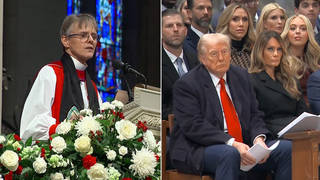
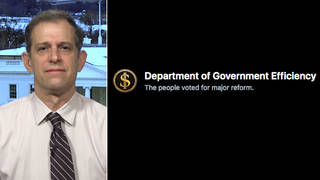
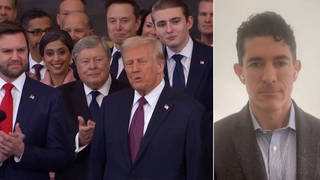
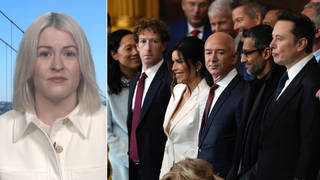





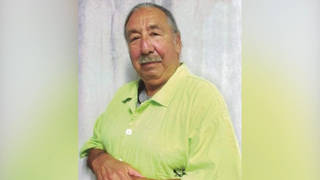
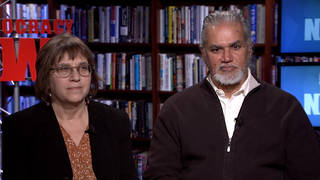
Media Options